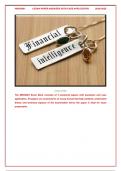MNG4801 4 EXAM PAPER ANSWERS WITH CASE APPLICATION 2020-2025
DISCLAIMER
The MNG4801 Exam Bank consists of 4 answered papers with questions and case
application. All papers are answered in an essay format that help students understand
theory and technical aspects of the examination hence the paper is ideal for exam
preparation.
,MNG4801 4 EXAM PAPER ANSWERS WITH CASE APPLICATION 2020-2025
Table of Contents
2024 EXAM PAPER .............................................................................................................. 3
2024 FI EXAM PAPER ........................................................................................................ 13
2023 EXAM PAPER ............................................................................................................ 22
2023 FI EXAM PAPER ........................................................................................................ 29
,MNG4801 4 EXAM PAPER ANSWERS WITH CASE APPLICATION 2020-2025
2024 EXAM PAPER
Question 1
1.1 Discuss the difference between intended, deliberate, and emergent
strategies. Support your discussion by integrating the appropriate
application of theory and examples from the TymeBank case study. (6)
Intended strategy
Intended strategy is a deliberate and premeditated plan of action that an organisation
establishes with the aim of accomplishing specific goals, as defined by Louw and
Venter (2019). It entails a deliberate and methodical endeavour to accomplish goals,
guided by a well-crafted strategy. TymeBank's intended approach is seen in its initial
launch in 2019, which is centred around offering simplicity, openness, and affordability
as its main selling points. The proposed strategy involved implementing a hybrid digital
banking model, which would involve the use of kiosks and forming partnerships with
retail networks such as Pick n Pay and Boxer. 0717513144This approach aims to
extend financial services to communities that now have limited access to them.
Deliberate strategy
Strategic decision-making refers to the deliberate selection of a certain course of
action by an organisation in order to accomplish its objectives according to Louw and
Venter (2019). This method is characterised by its adaptability since the organisation
actively pursues specific objectives and makes necessary adjustments. TymeBank's
intentional strategy is seen in its ongoing endeavours to broaden its range of products
and improve its services. The purposeful implementation of MoreTyme,
TymeAdvance, credit cards, insurance plans, and the acquisition of Retail Capital for
business financing aims to expand its customer base and enhance revenue
generation.
Emergent strategy
The process is spontaneous and develops gradually in reaction to unexpected
situations and fluctuating market conditions. TymeBank's emergent approach is
exemplified by its adept handling of the problems encountered at its initial launch,
including the unforeseen repercussions of the epidemic on financial markets. The bank
, MNG4801 4 EXAM PAPER ANSWERS WITH CASE APPLICATION 2020-2025
had to adjust and acquire adequate capital to ensure its progress towards profitability.
Moreover, the expansion in client base above the initial projections, necessitating
continuous modifications and improvements in the digital framework and offerings.
1.2 Critically discuss the role and value of integrating mechanisms in strategic
decision-making. As part of your discussion, refer to the role of processes
and technology in integrating intelligence. Support your discussion by
integrating the appropriate application of theory and examples from the
case study. (8)
Integrating mechanisms are essential in strategic decision-making since they help
synchronise different elements of an organisation, ensuring that decision-making
processes are cohesive and effective. The TymeBank case study emphasises the
critical contribution of processes and technology in facilitating the integration of
intelligence. Knowledge management (KM) entails a methodical procedure of
discovering, choosing, arranging, condensing, and delivering information to enhance
employees' understanding in a particular field of interest. TymeBank utilises
knowledge management (KM) to acquire and disseminate both explicit and tacit
knowledge produced via competitive intelligence (CI) and business intelligence (BI)
endeavours. TymeBank utilises AI, machine learning, and big data to promptly identify
real-time problems in the application process and offer instant feedback to clients.
The processes of socialisation, externalisation, combination, and internalisation are
essential to knowledge management (KM) and facilitate the conversion of tacit
knowledge into explicit knowledge within the organisation. The TymeCoach app
developed by TymeBank, featuring an AI-powered chatbot for financial education,
demonstrates the incorporation of knowledge-sharing procedures to support clients in
making well-informed financial choices.
Amplifying feeble signals serves as a vital technique for integration, enabling
organisations such as TymeBank to extract insights from information that may not be
immediately evident. TymeBank's implementation of strategies like scenario planning
allows them to proactively seek out subtle indications, test different theories, and
enhance understanding through productive disagreement and discussion. This
approach guarantees that individuals responsible for making decisions are thoroughly
informed and able to predict alterations in a constantly changing environment.






